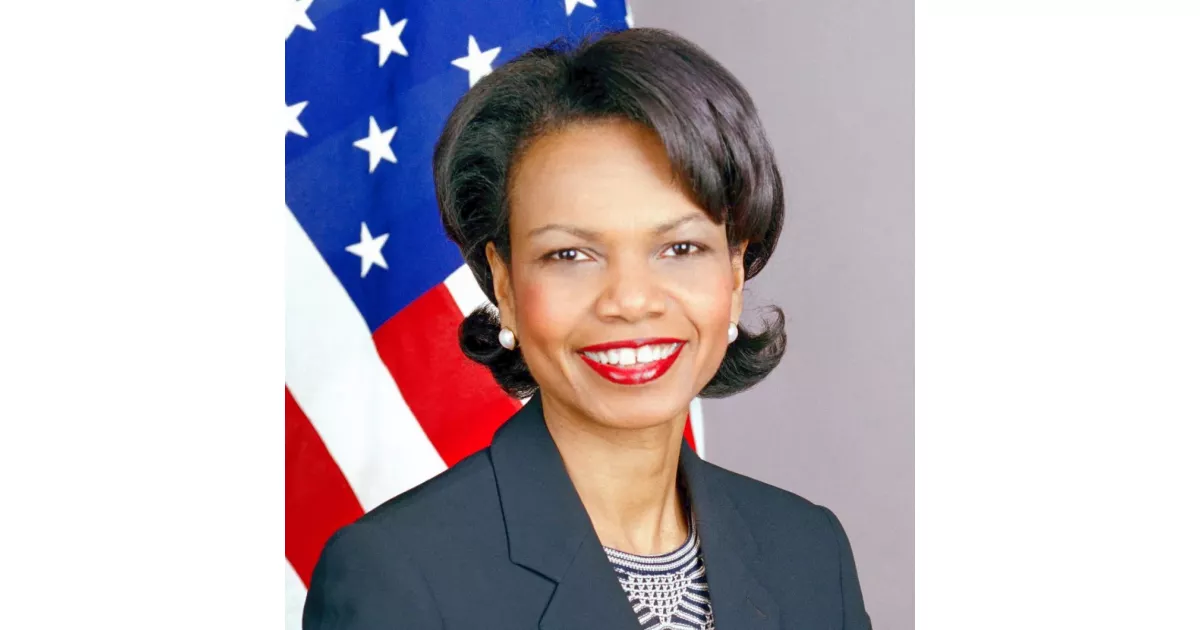Controversies are a part of history. Explore the biggest scandals linked to Condoleezza Rice.
Condoleezza Rice is a prominent American diplomat and political scientist, currently serving as the director of Stanford University's Hoover Institution. A Republican, she held significant roles in the George W. Bush administration, including as the 66th United States Secretary of State (2005-2009) and the 19th U.S. National Security Advisor (2001-2005). Rice made history as the first female African-American Secretary of State and the first woman to be National Security Advisor. Before Barack Obama's presidency, she and Colin Powell were the highest-ranking African Americans in the executive branch. Upon becoming Secretary of State, she was the highest-ranking woman in U.S. presidential line of succession at the time.
1985: North Korea Signed the Nuclear Non-Proliferation Treaty
In 1985, North Korea signed the Nuclear Non-Proliferation Treaty.
1994: Agreement between the United States and North Korea
In 1994, an agreement was reached between the United States and North Korea, in which North Korea agreed to freeze and eventually dismantle its graphite moderated nuclear reactors in exchange for international aid.
January 15, 2001: Resignation from Chevron
On January 15, 2001, Condoleezza Rice resigned from her position as head of Chevron's committee on public policy to become National Security Advisor to President George W. Bush. Chevron had named an oil tanker after her, Condoleezza Rice, but it was later renamed Altair Voyager due to controversy.
August 6, 2001: Characterized President's Daily Brief as historical information
On August 6, 2001, Condoleezza Rice characterized the President's Daily Brief, "Bin Ladin Determined To Strike in US", as historical information, stating it was based on old reporting.
July 17, 2002: Met with CIA director George Tenet to convey approval of waterboarding
On July 17, 2002, Condoleezza Rice met with CIA director George Tenet to convey the Bush administration's approval of the proposed waterboarding of alleged Al Qaeda leader Abu Zubaydah.
December 8, 2002: Iraq delivered its declaration of weapons of mass destruction to the United Nations
After Iraq delivered its declaration of weapons of mass destruction to the United Nations on December 8, 2002, Condoleezza Rice wrote an editorial for The New York Times entitled "Why We Know Iraq Is Lying".
2002: North Korea Revealed Secret Nuclear Weapons Program
In 2002, North Korea revealed they were operating a secret nuclear weapons program that violated the 1994 agreement.
January 10, 2003: Rice's statement on Iraqi nuclear capabilities
In a January 10, 2003, interview with CNN's Wolf Blitzer, Condoleezza Rice stated that "we don't want the smoking gun to be a mushroom cloud" regarding Saddam Hussein's nuclear capabilities.
January 18, 2003: Involved in crafting Bush's position on race-based preferences
On January 18, 2003, The Washington Post reported that Condoleezza Rice was involved in crafting President Bush's position on race-based preferences, advocating for race to be considered as one factor among others in university admissions policies.
2003: Briefed on waterboarding and other methods
In 2003, Condoleezza Rice, along with Vice President Dick Cheney and Attorney General John Ashcroft, were briefed on the CIA's use of waterboarding and other interrogation methods, and they reaffirmed that the CIA program was lawful and reflected administration policy.
2003: Cheney Suggests Rice Misled President on Nuclear Diplomacy
In 2003, Dick Cheney suggested that Condoleezza Rice misled the president about nuclear diplomacy with North Korea, calling her advice "utterly misleading." He also criticized her for clashing with White House advisers on the tone of the president's speeches on Iraq and wrote that she, as the secretary of state, ruefully conceded to him that the Bush administration should not have apologized for a claim the president made in his 2003 State of the Union address, on Saddam's supposed search for yellowcake uranium..
2003: North Korea Withdrew from the Non-Proliferation Treaty
In 2003, North Korea officially withdrew from the Non-Proliferation Treaty.
March 2004: Declined to testify before the 9/11 Commission
In March 2004, Condoleezza Rice initially declined to testify before the National Commission on Terrorist Attacks Upon the United States (the 9/11 Commission), citing executive privilege, but later agreed under pressure from President Bush.
January 2005: Barbara Boxer Criticizes Rice at Confirmation Hearing
During Condoleezza Rice's confirmation hearing for U.S. Secretary of State in January 2005, California Democratic senator Barbara Boxer criticized Rice, stating that her loyalty to selling the war in Iraq overwhelmed her respect for the truth.
January 2005: Rice Uses "Outposts of Tyranny" Term
In January 2005, during President Bush's second inaugural ceremonies, Condoleezza Rice first used the term "outposts of tyranny" to describe countries she viewed as threats to world peace and human rights, identifying Cuba, Zimbabwe, Burma, Belarus, Iran, and North Korea as such outposts.
August 2005: Harry Belafonte Refers to Blacks in Bush Administration as 'Black Tyrants'
In August 2005, Harry Belafonte referred to blacks in the Bush administration as "black tyrants," sparking mixed reactions.
September 14, 2005: Rice Dismisses Criticism
During a September 14, 2005 interview, Condoleezza Rice dismissed criticisms of her stances and statements on various issues, saying, "Why would I worry about something like that? ... The fact of the matter is I've been black all my life. Nobody needs to tell me how to be black."
2005: North Korea agreed to give up its entire nuclear program
In 2005, North Korea agreed to give up its entire nuclear program in exchange for security guarantees and economic benefits to ensure its survival.
2006: North Korea Test Fired Long Range Missiles
In 2006, despite the agreement in 2005, North Korea test fired long range missiles, leading the UN Security Council to demand North Korea suspend the program.
2006: Asserted she did not recall specific July 2001 meeting
In 2006, when questioned about the July 2001 meeting with George Tenet, Condoleezza Rice asserted she did not recall that specific meeting, stating she had met repeatedly with Tenet that summer about terrorist threats and found it "incomprehensible" that she would ignore terrorist threats before the September 11 attacks.
January 11, 2007: Boxer Debates the War in Iraq
On January 11, 2007, during a debate over the war in Iraq, Barbara Boxer questioned who would pay the price for the war, highlighting the American military and their families.
2007: Nuclear Agreement with North Korea
In 2007, Condoleezza Rice was involved in another nuclear agreement with North Korea (Pyongyang) where North Korea agreed to close its main nuclear reactor in exchange for $400 million in fuel and aid.
July 2008: Bolton Criticizes Bush Administration Reversals
In July 2008, John R. Bolton criticized Condoleezza Rice and her allies in the Bush Administration for abandoning hard-line principles, stating that these reversals destroyed credibility.
April 2009: Stated she did not authorize the CIA to use torture
In April 2009, Condoleezza Rice stated that she did not authorize the CIA to use torture, but rather conveyed the administration's policy authorization subject to Justice Department clearance, under the understanding that it did not violate obligations under the Convention Against Torture.
2011: Rice Responds to Rumsfeld's Criticism
In 2011, Condoleezza Rice responded to Donald Rumsfeld's portrayal of her as a young, inexperienced academic, stating that he "doesn't know what he's talking about." She addressed the issue in her book, detailing disagreements over Pentagon coordination.
2013: Rice charged Iran with untrustworthiness
In 2013, Condoleezza Rice accused Iran of being untrustworthy due to decades of concealing its nuclear program and misleading the International Atomic Energy Agency.
2015: Human Rights Watch called for the investigation of Rice
In 2015, Human Rights Watch called for the investigation of Condoleezza Rice for conspiracy to torture and other crimes, citing her role in authorizing the use of "enhanced interrogation techniques".
February 2017: Opposes Trump Administration's Travel Ban
In February 2017, Condoleezza Rice publicly announced her opposition to the Trump administration's travel ban.
May 2017: Opposes Removal of Confederate Monuments
In May 2017, Condoleezza Rice stated she opposes the removal of Confederate monuments and memorials or renaming buildings named after Confederate generals, arguing that sanitizing history is a bad thing.
November 18, 2018: Rice considered for Cleveland Browns head coach position
On November 18, 2018, ESPN's Adam Schefter reported that Condoleezza Rice was being considered as a candidate in the Cleveland Browns' head coach search, leading to jokes and controversy due to her lack of coaching experience.
September 2019: Rice Dislikes Trump's Rhetoric
In September 2019, Condoleezza Rice publicly expressed her disapproval of President Trump's rhetoric, particularly on immigration, and cautioned him to be more careful with his words due to the sensitivity of race relations in America.
August 2021: Rice critiques the US withdrawal from Afghanistan
In August 2021, Condoleezza Rice penned an op-ed arguing that the United States withdrew from Afghanistan too rapidly and criticized the narrative that blamed Afghans for the Taliban's takeover.
Mentioned in this timeline

Donald John Trump is an American politician media personality and...
Ukraine is a country in Eastern Europe the second-largest on...

Barack Obama the th U S President - was the...

Hillary Diane Rodham Clinton is a prominent American politician lawyer...

John F Kennedy JFK was the th U S President...

George W Bush the rd U S President - is...
Trending

50 minutes ago Jannik Sinner's highlights, upcoming match against Jakub Mensik and ATP Doha analysis.

51 minutes ago Haley Winn's brothers gain viral fame supporting her at the Olympics with unique outfits.

51 minutes ago Olga Mikutina to represent Austria in Figure Skating at 2026 Olympics.

52 minutes ago Lara Gutmann: Snowboardcross Prospect, Haemmerle's Olympic Victory, and Team USA's Figure Skating Hopes

2 hours ago Kimmy Repond faced setbacks but realized her Olympic dream after an injury.

2 hours ago Olympic Victories and Near Misses: Grondin's Close Call and Haemmerle's Snowboard Triumph
Popular

Jesse Jackson is an American civil rights activist politician and...
Randall Adam Fine is an American politician a Republican who...

Pam Bondi is an American attorney lobbyist and politician currently...

Barack Obama the th U S President - was the...

Ken Paxton is an American politician and lawyer serving as...

Bernie Sanders is a prominent American politician currently serving as...

